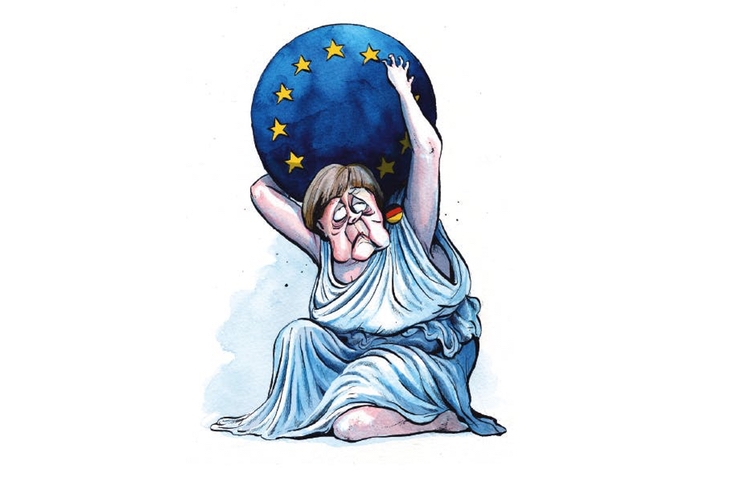Theresa May’s Florence speech may have been welcomed with cautious optimism by Michel Barnier, but the reaction in Germany has been decidedly more downbeat. ‘In substance, May is bringing no more clarity,’ tweeted German MEP Manfred Weber. ‘I am even more concerned now.’ Weber is Chairman of the centre-right European Peoples Party, the biggest grouping in the European Parliament, and a rising star in Angela Merkel’s Christian Democratic Union. So does he speak for Merkel? Well, that would be pushing it, but while ‘Mutti’ maintains her deafening silence about all matters Brexit, it’s probably the closest we’re going to get. ‘The clock is ticking and time is running faster than the government believes in London,’ added Weber. ‘EU citizens in the UK need legal certainty.’
The German press has been a bit more positive – but not much. ‘Briten wollen Freunde bleiben,’ (Britons want to remain friends) is the headline in the Suddeutsche Zeitung, Germany’s equivalent of the Guardian. The paper’s Stefan Kornelius calls her speech ‘a bold offer,’ but, from a German perspective, that’s about as good as it gets. Handelsblatt describes it as ‘an attempt to do the splits.’ ‘May can’t escape the cage she’s built,’ argues the Bundesrepublik’s answer to the Financial Times. ‘If the negotiations carry on at this pace, even a two year transition period won’t be enough.’
So what does this all mean for Anglo-German relations, and, in particular, Anglo-German trade? Germans are under no illusions that a hard Brexit will hurt German industry. Around 15 percent of cars made in Germany end up in the UK. Deloitte concluded that of the 60,000 German jobs that depend on exporting cars to Britain, 18,000 are at risk, as a weaker pound and higher tariffs increase UK prices for German cars by as much as 20 percent.
So will Merkel put pressure on Barnier to cut a bespoke trade deal with Britain, to protect German carmakers? Fat chance. Brexiteers argue (quite rightly) that Brexit is about more than money. The same principle applies to Germany’s Europhile establishment. Rightly or wrongly, the majority of Germans believe European integration has kept the peace in Europe since the Second World War, and enabled Germany to become prosperous, reunited and respectable once again. Like Brexit, this isn’t a matter of facts and figures so much as a matter of belief, and so long as most Germans believe it, it’ll trump all other factors – German car exports included.
For German politicians, there are more hard-headed considerations, too. Britain currently accounts for about 7 percent of German exports, but Germany has land borders with eight other countries in the Single Market – nine, if you count Switzerland. Exports to these nations account for over a third of German trade. France is a bigger market than Britain, at around 8.5 percent. Holland alone accounts for 6 percent. A special deal with Britain might protect some German exports, but if it endangered the unity of the Single Market, German industry would stand to lose far more than it stood to gain.
As the most prosperous and populous country in Europe, sat in the centre of the Continent, Germany can’t help but drive the European project. Yet Britons tend to overestimate its direct influence on other EU states. Diplomatically, Germany’s size and strength is as much of a liability as an asset. Mindful of its horrific history, Germany often has to tiptoe around its fellow EU members (Britons aren’t the only ones who resent being bossed around by Germans). The EU27 appointed Michel Barnier to act in their joint interests. For Germany to try and influence his negotiations with Britain in order to protect German exports would be disastrous for its relations with its EU partners.
Germans underestimate the strength of patriotic feeling that Britons feel for the United Kingdom – Britons underestimate the strength of patriotic feeling that Germans feel for the European Union. If May’s speech did nothing else, it at least began to square this circle. Is it too much to hope for a successful Brexit and a successful EU? We’re not there yet. Talking to German newspaper, Die Welt, German MEP Sven Giegold called May’s speech ‘a first step towards accepting reality,’ but on Twitter he was more robust. ‘Britain always wanted a special deal in the EU,’ he tweeted. ‘Now May wants a special deal outside the EU. Not fair!’






Comments